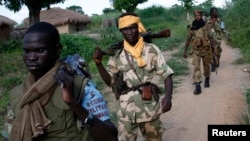U.N. experts have called for militia fighters to be expelled from the Central African Republic's armed forces, but other observers said that's easier said than done and might jeopardize upcoming peace talks.
The call came in an interim report released this month on the communal violence sparked last year between mostly Muslim Seleka rebels who took power and mostly Christian anti-balaka militias.
Since then, thousands of people have been killed and half the country's population displaced.
A United Nations panel, investigating the sources of weapons and funds that belong to the two main militia groups in the C.A.R., said militia fighters need to be excluded from the country's security forces.
The report said the armed forces have been a main source of weapons, fueling the conflict, and the lines between who is a solider and who is a militiaman are blurred.
But experts do not all agree on the subject of integration versus exclusion.
Kasper Agger has been investigating C.A.R.'s armed groups for the U.S.-based Enough Project.
"On paper, it sounds like a good idea if you could just remove those that are members of the army and also anti-balaka. Practically speaking, I am not sure how it would happen,” Aggers said.
“Vetting who are members of the armed groups and who are not is an extremely complicated process. And unless you go in with the right capacity to do this then I fear you would do more harm than good,” he said.
Unrealistic
Human Rights Watch's Lewis Mudge agreed that it is unrealistic to think of excluding all militia members from the army, as there are just too many of them.
In fact, he said, more of them will ultimately need to be incorporated in the army.
"I think any type of reconciliation between the transitional government and the Seleka forces is going to have to incorporate further soldiers from both sides being incorporated into the security forces,” Mudge said.
The national army known, as the FACA, disintegrated last year as Seleka rebels marched on the capital, Bangui.
After the Seleka lost control of Bangui to French and African Union peacekeepers, the FACA started to reassemble. The national army is now being paid with donor funding, but Aggers said there is little trust these soldiers can act as a neutral force and they have no real function.
"They don't have specific tasks at the moment. They do have to meet up at the barracks - I think it's once a week or once a month. They're not given any weapons or anything, but they do walk around and wear their uniforms, and they're paid,” Aggers said.
This issue of who participates in the security forces will likely be key to reaching a peace deal and the players at the table will include both factions.
The first indication may come this weekend in Brazzaville - where anti-balaka and Seleka representatives may sign a cease-fire.
Meanwhile, outside the capital, the U.N. said most inhabited areas of the country are under militia control, despite the presence of some 8,000 French and African peacekeepers in the C.A.R.
Militia fighting
In the strategic town of Bambari, for example, Mudge, of Human Rights Watch, said a relatively strong concentration of peacekeepers have been unable to prevent rival groups from slaughtering scores of people.
"I can't give you an exact number of how many peacekeepers are there because they wouldn't tell me for strategic reasons. But it was a good amount. We saw lots of French troops in armored vehicles patrolling the town,” Mudge said.
“The problem is that the Seleka still completely control Bambari. They're patrolling the streets in pickup trucks with heavy armament on top. In the Muslim neighborhood of Borno, one out of every three men had a rifle or a Kalashnikov. So disarmament has not been effective,” he added.
Most experts stress the need for local as well as national dialogue to reach reconciliation, and above all, job creation schemes to help many combatants return to civilian life.




